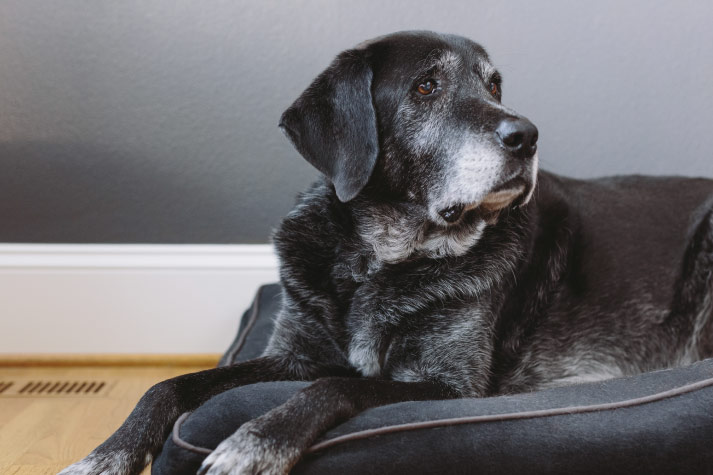


26 Aug
The needs of dogs change significantly as they grow older. One of the most overlooked aspects of pet care is providing the right kind of bed for an ageing companion. While younger dogs may sleep comfortably on almost any surface, elderly dogs require more tailored support to maintain their health, comfort, and mobility. Selecting the right pet bed can make a remarkable difference in quality of life, reducing pain, encouraging restful sleep, and even supporting emotional well-being.
Older dogs often suffer from conditions such as arthritis, hip dysplasia, or general stiffness. Their joints are less forgiving, and lying on hard or uneven surfaces can increase discomfort. Temperature sensitivity also becomes more pronounced with age, which means a bed that regulates warmth and cushioning is not simply a luxury but a necessity.
Pet care for senior animals begins with recognising these challenges. Just as humans transition to specialised mattresses in later life, dogs also require adaptations that accommodate declining mobility and changing body conditions. Choosing the right pet accessories, particularly a supportive bed, becomes a fundamental part of responsible ownership.
Not all pet beds are created equal, and the variety available in today’s market can be overwhelming. The following features are especially important when selecting a bed for an elderly dog:
Orthopedic foam or memory foam is highly recommended because it distributes weight evenly and cushions pressure points. This type of material helps relieve pain in the joints, hips, and spine. For dogs with arthritis, an orthopedic bed is not just comfortable; it can prevent further deterioration caused by poor rest.
Ageing dogs often struggle with mobility. Beds with high sides or elevated platforms may be difficult to climb into. Look for designs with low entry points or bolsters that provide support without creating barriers. In this stage of life, accessibility is as important as comfort.
Hygiene is a critical element of pet care, particularly for older dogs who may experience incontinence or reduced grooming ability. A bed with a removable, machine-washable cover ensures cleanliness and extends the lifespan of the accessory. Materials should be both soft and durable, standing up to frequent washing without losing texture.
Senior dogs are more sensitive to cold. Beds with thermal layers or self-warming materials can help maintain body temperature, particularly during colder months. Conversely, if the dog is prone to overheating, breathable fabrics or cooling gel inserts can help regulate warmth.
The bed should accommodate the dog’s full length without forcing them to curl uncomfortably. Round beds may be suitable for smaller breeds that like to nest, while rectangular beds with bolsters may provide better support for larger breeds. Choosing the right size and shape is one of the most practical steps in pet accessories shopping.
It is tempting to assume that any soft cushion will suffice, but the impact of a properly chosen bed extends far beyond comfort. Sleep quality directly affects an elderly dog’s energy levels, immune system, and mood. Just as importantly, consistent, pain-free rest supports mobility during waking hours.
The psychological benefits are also worth noting. Dogs, especially as they age, value routine and safe spaces. A designated pet bed provides a sense of security, helping to reduce anxiety when the environment feels unpredictable. For dogs who travel with their families, a portable bed also doubles as a familiar anchor in new surroundings, blending pet travel with consistent care.
One of the most profound benefits of the right pet bed is the way it supports daily mobility. Senior dogs already experience a natural decline in agility, and painful sleep only accelerates this process. By cushioning joints and allowing muscles to relax overnight, the right bed helps maintain flexibility. Over time, this translates into easier walks, improved mood, and a better overall quality of life.
For pet owners who travel frequently, choosing a lightweight but supportive bed can extend these benefits to life on the road. Pet travel often disrupts routine, but bringing along a familiar bed maintains continuity and eases stress for older animals.
While prices for pet beds vary widely, cost should not be the only factor. A cheap cushion may seem appealing, but it will rarely offer the support or durability an elderly dog requires. Higher-end orthopedic models may cost more, but they often outlast cheaper alternatives and prevent costly health complications. Considering the role of the bed in broader pet care, it is an investment in both comfort and health.
Caring for an elderly dog requires adjustments in many areas, from diet to daily routines. Among these changes, selecting the right bed is one of the simplest yet most impactful steps an owner can take. The right choice improves comfort, supports mobility, and enhances emotional security. When viewed as part of a wider commitment to pet care, alongside nutrition, accessories, and even thoughtful pet travel, the benefits extend well beyond sleep.
Ultimately, the goal is not just to provide a place for rest but to create an environment where an ageing companion can thrive, feel safe, and enjoy a dignified quality of life. A well-chosen pet bed is more than an accessory; it is an essential tool in ensuring that senior dogs continue to experience comfort, stability, and the care they deserve.

AUTHOR’S BIO
Shivangi Lawania
Storytelling is my way of bringing ideas to life. I enjoy shaping words that spark curiosity and connection, while keeping a strong focus on branding and communication. For me, great content blends creativity with clarity to leave a lasting impression.